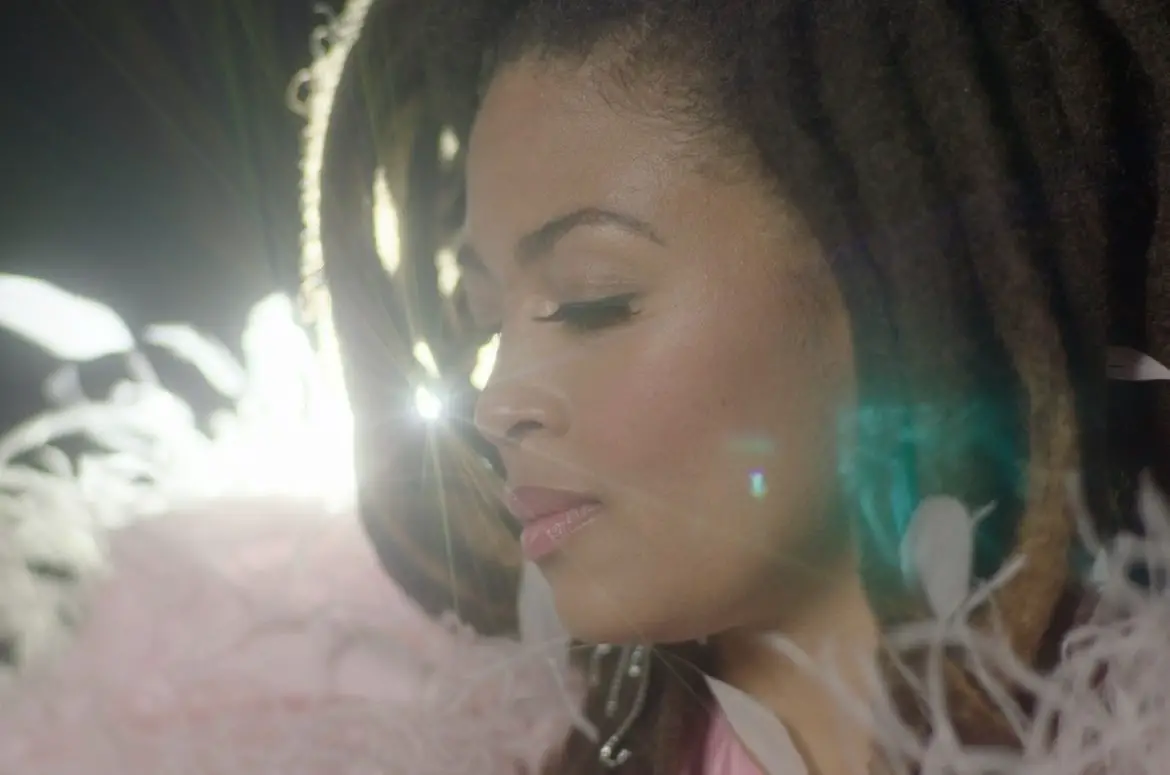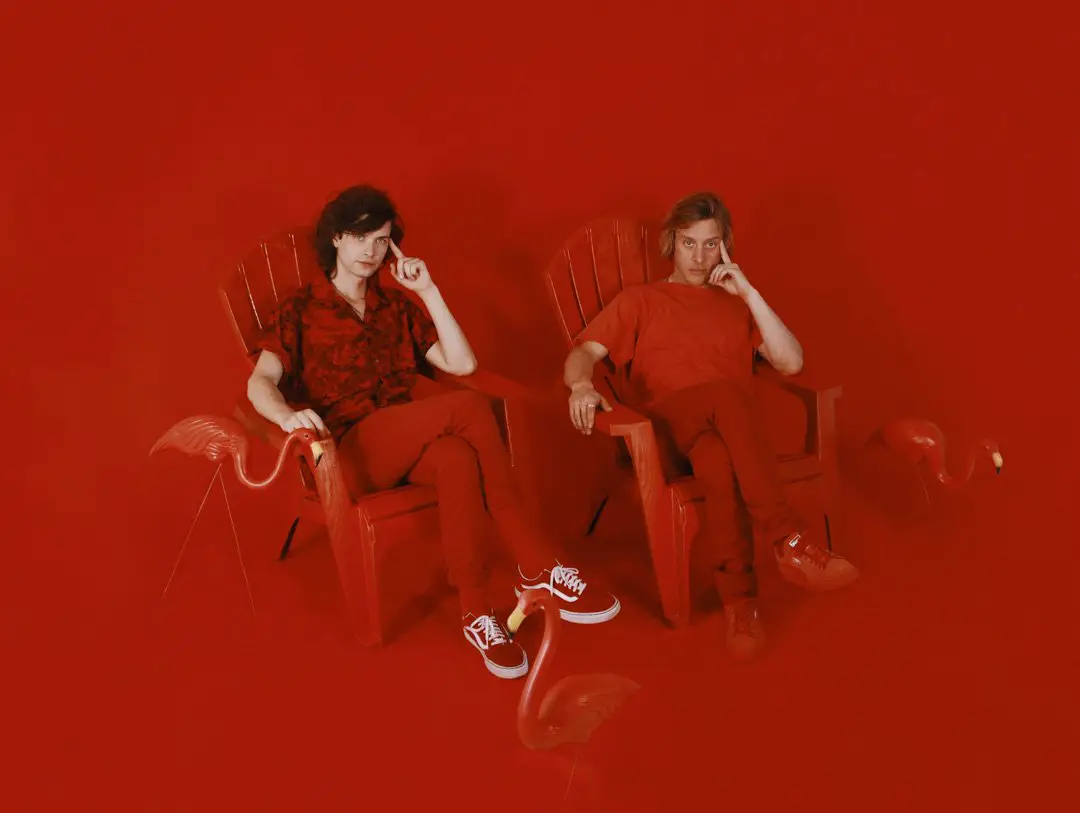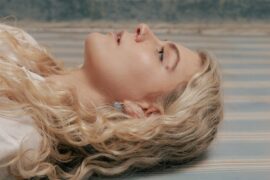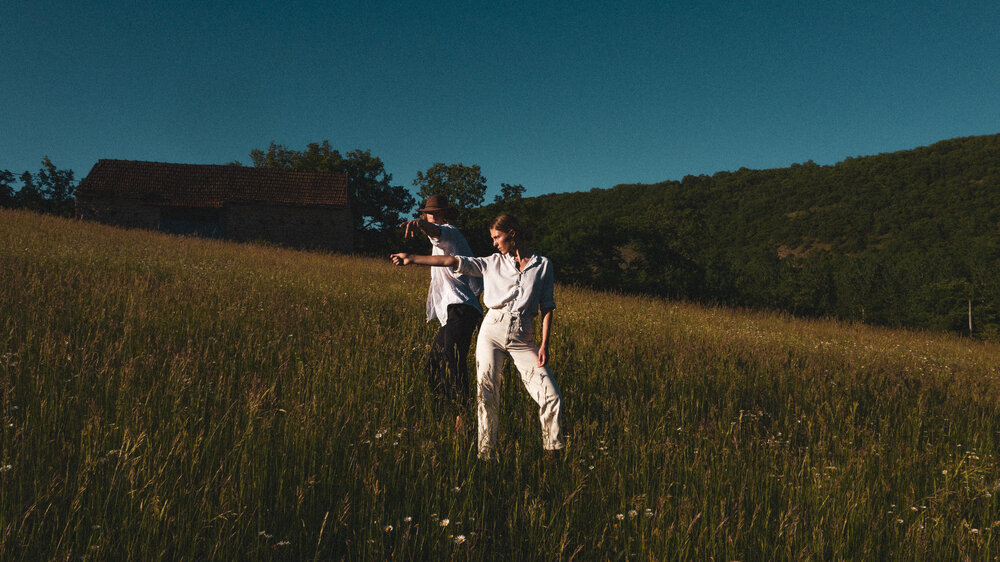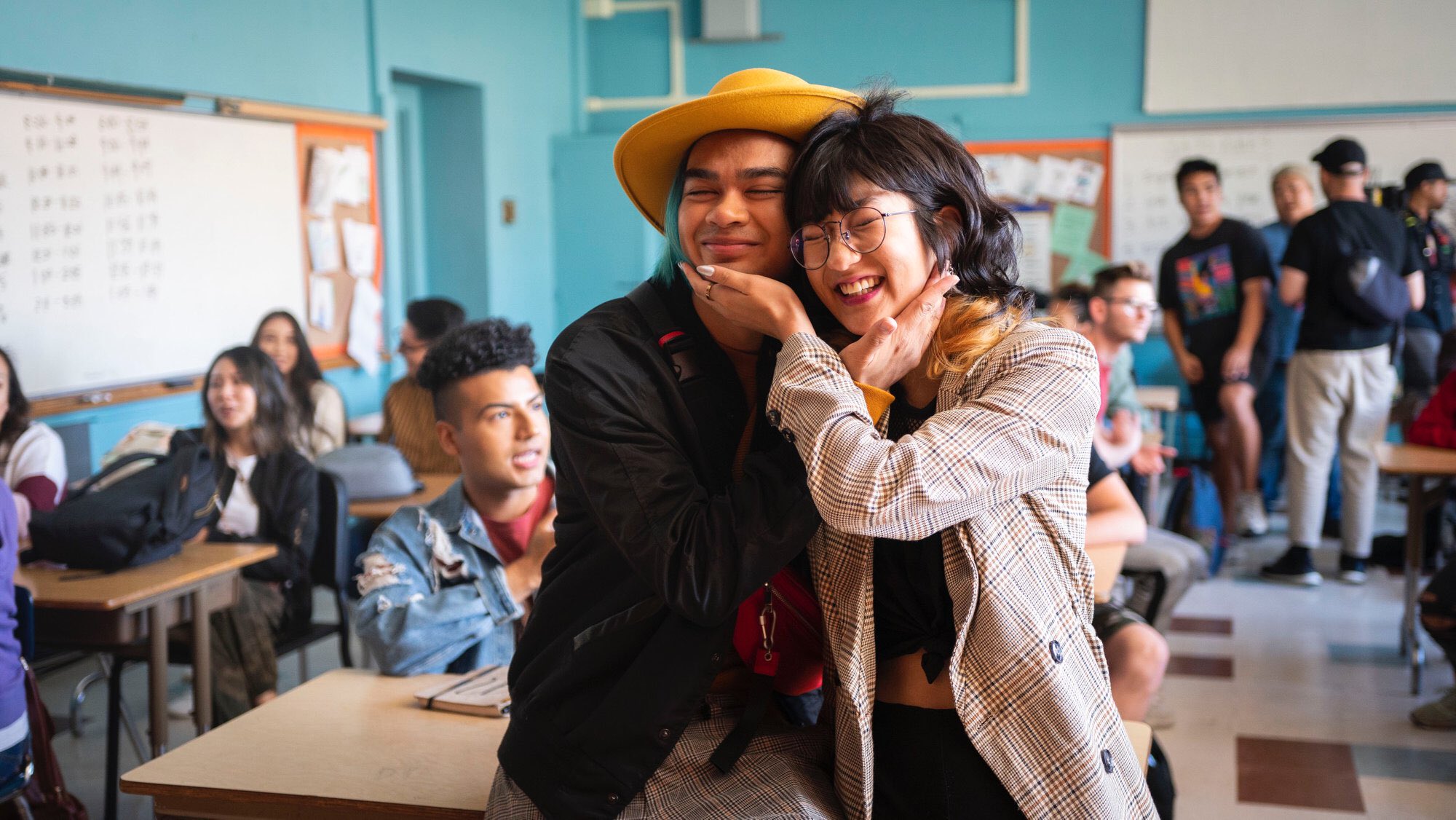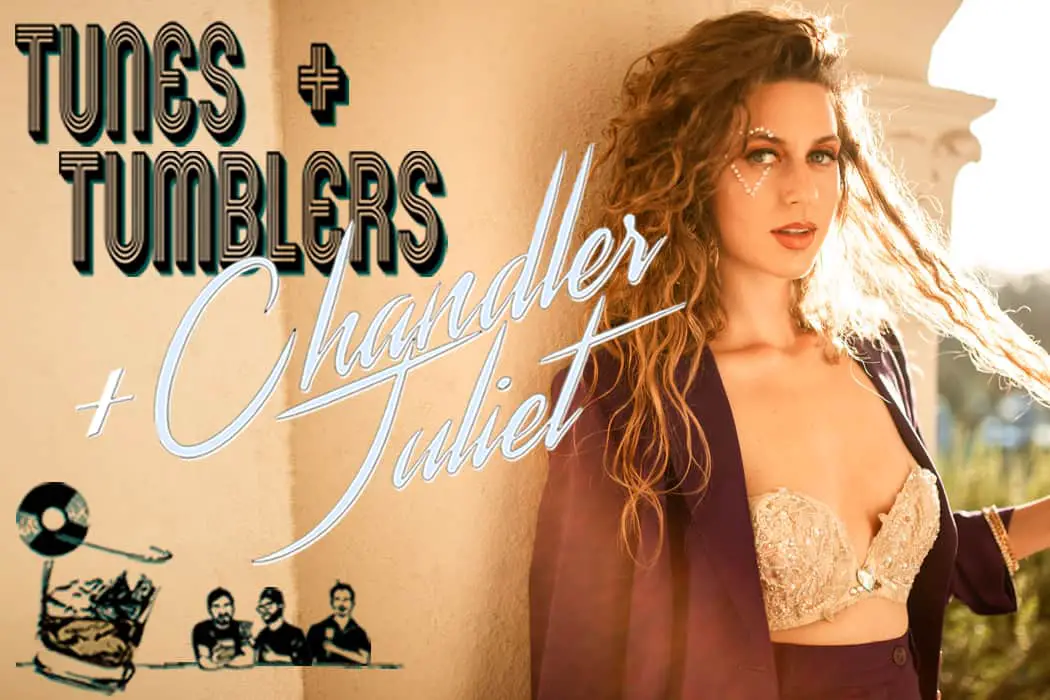Valerie June discusses her fifth studio album ‘The Moon and Stars: Prescriptions for Dreamers’, a tutorial on how to shine taught by a twinkling star.
‘The Moon and Stars: Prescriptions for Dreamers’ – Valerie June
Just like her latest release, The Moon and Stars: Prescriptions for Dreamers, Valerie June is magical and cannot be categorized in any other way.
Though it would be correct to say that Valerie June’s sound has been influenced by great artists in genres like Appalachian Folk, Soul, Blues, Bluegrass and Rock n’Roll, it would be incorrect to use any of those labels to classify her music. And while it would be correct to say that Valerie June is responsible for bringing her music to the fore, she would argue that she isn’t a songwriter, rather a humble portal through which these songs travel from the ether to this physical world.
And while all of that sounds extremely floaty and ethereal, the dichotomy continues because Valerie June is, in all her philosophical ponderings, extremely down to earth, balanced, and real. Go figure.

By meandering through Valerie June’s recent discography – from her 2013 release, Pushin’ Against a Stone, to 2017’s The Order of Time, to this year’s The Moon and Stars: Prescriptions for Dreamers, a few things become refreshingly clear. First and foremost, Valerie June’s ability to express the respirations of life through relatable lyrics is masterful. And most likely, no matter how dingy the subject matter, she’ll have you feeling understood while dancing and smiling through.
A great example of this salty yet sweet phenomenon is “Smile,” off The Moon and Stars: Prescriptions for Dreamers, that tells us,
Well if you never leap
Then your heart won’t know
So you take the chance
So you just let go
And you’ll get knocked down
But that’s how you grow
It’s a concept familiar to most hearts, and if it’s not… it will be one day, if you’re doing life right.

Also, by following the breadcrumbs of Valerie June’s releases through to The Moon and Stars: Prescriptions for Dreamers we can learn what it means to dream, aspire and grow. With each album, Valerie June has opened herself up to learning the lessons made available to her by the producers who have helped allow each album to take its best shape.
Like a vigilant mother guarding her children from any force that may threaten their ability to live their best life, Valerie June protects her artistic ventures. And while she humbly does not take full credit for a songs finished product, she does take responsibility for its well being. That’s why, on The Moon and Stars: Prescriptions for Dreamers,Valerie June tried her hand at production. Working together with master producer, Jack Splash, Valerie June enjoyed the opportunity to see how an album is taken from its seedling form and nurtured to the flowering spring of its releasable form.
Atwood Magazine caught up with Valerie June to discuss her adventures with her latest contribution to the musiverse, The Moon and Stars: Prescriptions for Dreamers. Less a typical conversation, and more an interactive tutorial on how to be positive, speaking with Valerie June was like taking a master class on how to shine taught by a twinkling star.
— —
:: stream/purchase Valerie June here ::
A CONVERSATION WITH VALERIE JUNE

Atwood Magazine: Hey Valerie, how's it going?
Valerie June: Great! Hi, Ilana!
I'm so happy to speak with you, how's your day going?
Valerie June: It’s a rainy day, but it’s going well – we need the rain sometimes.
Definitely. So Valerie, we're here to talk about your awesome album, The Moon and Stars: Prescriptions for Dreamers. I have really enjoyed listening to this album. The title itself paints such a wistful picture. How does that relate to the rest of the songs on the album? Is there a theme that you were envisioning or is it just the songs that were naturally coming to you at this time?
Valerie June: Well, as far as the way that the songs ended up and the theme of the record, it definitely is a dreamer’s journey. It starts with “Stay,” which is a realization that, yes, everything that we experience on earth, the beauty and the dangerous more painful things, all of it is fleeting. So that as things change, one season to the other, just focusing on the beauty of the moment, and that the impermanence itself could be magical and it can be great and it can be like a seed for a dream. And so then it goes into “You and I” which is a song about sharing and community. And…
I love that song… I mean, I love all the songs, but that one's my favorite.
Valerie June: Aw, Thank you! It’s a very active song. [laughter]
Yeah, well, I can imagine that it's a little bit like doing vocal gymnastics to reach that note.
Valerie June: Yeah. I remember trying to do that that day, it was years ago actually, that I recorded that note. [laughter] Thank God I did that.
You were saying that “You and I” is a community song.
Valerie June: Yes, it’s when you realize that if you’re going to set out on a journey, then you’re gonna… Well, your goal is to share it with the world, and to build friendships and build communities with it. And then “Colors” is where you really start to get a shape of what you’re seeing, what you wish to share and what your dream might be. And “Stardust Scattering” is a song that’s full of hope, because it’s like, well, if you were to blow a kiss and all of the things that came out were beautiful stars, then that would be that song. But then all the magic of a dream, when you actually decide to go for it, you’ll be little scared because society and the world might not be set up to support a dreamer, and usually it’s not. And so “Call Me A Fool” is a song where you’re like, “Okay, I know that I’m just a dreamer and I’m just a fool and that I love something that is probably gonna be… That might not work out for me,” but you dive in anyway. And if you dive in, you can end up falling sometimes. Dreamer’s journeys are full of fear and doubt and mistakes or failure, and you have to learn how to fall and you have to learn how to sit in that failure and to learn how to feel every single note of it. And it’s dry and it’s painful and you can feel the anxiety sometimes.
But then it does stop, and you say, “Well, that was odd, that felt like crap.” But it just stopped and you begin to realize that you’re goal is in your journey, and you just smile because you realize that it’s this internal journey, and that all of our dreams and everything we’re hoping for, whether it’s personal or for humanity, is for an inner goodness, there’s something real inside to be shared and opened up. And so then you get to, after “Smile” you get to “Within You” and that’s that mantra song, that’s repeating, “Hey, it’s in you, you’ve got this.” You know?
And you got “Two Roads” which that’s very much inspired in the way of Robert Frost and him saying, “Which road would you take?” in that poem Two Roads. And after that, you decide to take the road less traveled and reach the… bright stars. And you realize that you can’t say that you did shit without the community, without the world, it comes back from “You And I” at the end. [chuckle] Because it’s not suitable to say, that, “I achieved this dream.” No. We achieved this dream.
And we return back home to your inner place and lands with the birds singing, which is kind of like the best music in the world and that little meditation at the end is this moment where you’re sitting and levitating in the middle of this dream and you feel like, “Yeah, it’s all worth it, even if it doesn’t come true in your lifetime, it’s worth it.”
It's so comforting, also, going back to the idea that everything's fleeting, the good and the bad. It helps a dreamer to go through the bad, too, and enjoy the good for what it is, because you know it isn't permanent. Then we'll go back through another cycle.” It helps us to keep dreaming forward.
Valerie June: It’s true and we do need that. We need more dreamers in the world, first of all. Dreamers, like the type that Dr. King was or Amanda Gorman, this young, amazing poet that’s all over the public now.
She's incredible.
Valerie June: We need these dreamers, and so… But dreamers can’t be… They can’t be losing steam just because that moment of impermanence comes along. No, you ride that wave, you deal with the lows and the bad…
Such a powerful concept. I like to think of myself as a dreamer (a different league than Martin Luther King Jr. or Amanda Gorman but still…). Your words are very comforting. Thank you for that. In past interviews you’ve discussed the idea of manifesting your dreams. I noticed that there are a number of tracks on The Moon and Stars: Prescriptions for Dreamers that are very meditative. What role does meditation play in your life?
Valerie June: It’s my settling point, but also I try to keep it constant throughout my day. The goal for my lifetime, is to be able to bring the state that I reach when I’m in a deep meditation into my present life. To allow my life to be a living meditation, always connecting with that meditative place that I go to. And have that be in every moment. Yesterday, I drove over here from the city, and as I was driving, I didn’t listen to music, I didn’t listen to anything, I just observed everything on the road and followed my breath and did my affirmations and when I got out of the car, I kept that going as I went into the house, and between interviews, and before I went to bed and when I went on my walk, I just stayed in that space.
I think it’s very important for dreamers to stay in this space of creativity and magic, and that’s what meditation does for me. It carves that space of creativity and magic, so I can go on being magical.

Beautiful, I love this idea. So, when you're writing an album how do you replenish your spiritual energy? Is it meditation by itself or are there other creative outlets that you use to refill your creative spirit?
Valerie June: There are a number of things, and I’ve developed personal practices over the course of, I guess, my adult life and even started when I was a kid. And these practices are anything from hanging out with my plants and gardening, because plants are so much wiser than we are.
Oh my gosh, I’m completely with you.
Valerie June: And to think that plants have been here longer than we have, so they know more. I mean, gardening is huge. And just even if you don’t garden, appreciating nature and beauty and all of that.
Totally! I’ve always felt this about gardening too. My name, Ilana, means “tree” in Hebrew and maybe in some way has always connected me to this idea somehow. I love the feeling of planting, nurturing and growth. It’s got a special magic about it too.
Valerie June: And there is something so special about trees and their roots, all of it connected, you know? [chuckle] I have so many little meditating practices. ‘Cause, one type of meditation doesn’t always work. Sitting meditation doesn’t always work for my energy, sometimes I need to do walking meditation or sound meditation, or dance other times. So having about five to ten practices that you can do for ten minutes, which then becomes twenty minutes, then thirty minutes, then a day… it’s the way I keep my spirit healed so I can create music. And also not putting any kind of pressure on myself to write any songs or to write an album, it just comes when it comes, and if it doesn’t come, then it doesn’t come. [laughter]
So, what do you do... how do you perform on command then? If you have a deadline to reach and you need to have everything finished. How do you accomplish what you need to by a certain time?
Valerie June: What I’ve been doing for the last couple of decades is writing songs as they come, while I was cleaning houses, while I was working at the coffee shop, while I washed dishes, sometimes in my sleep, in dreams. And I just write them and I put them in a special place. One interviewer said, “Is it like a magic box with songs?” And I’m like. “Yeah, I guess you can say that,” I put them in the box. And so when I’m ready to work on a new record, I open the box and I go back and I listen to all of my songs to decide which ones are jumping out of this box right now?
Note to self… get magical box…
Valerie June: Haha. That’s how I don’t receive pressure to create because, creating happens as I’m living.
So it’s a constant evolution.
Valerie June: Yeah, it hasn’t stopped so far, so I hope it will keep going. [chuckle]

Well, I imagine that if you keep your practice of trying to be meditative throughout your daily life, the creative energy should stay with you, that's my prediction. I'm gonna try to do that too. I like that idea a lot. You’ve described some of your favorite singers as having “perfectly imperfect” voices. How does that perspective play out when you're listening to your own music?
Valerie June: hahahahha Yeah, and I really don’t think I have a perfect voice at all, it’s so…
Nobody does!
Valerie June: Yeah. That’s true. But if you got to know me, you’d probably realize that I’m my own worst critic, and so sometimes when I hear my voice I’m like, “Oh my god, is that what I sound like?“
Valerie, you have a perfectly imperfect voice!
Valerie June: And other times I listen to it and I’m like, “Man, I love this, that’s great,” and so, it goes up and down with me personally.
I get that, I had a suspicion that you were gonna say that when I asked the question, but just think… I know how much you love Elizabeth Cotten. When she listened back to her music, do you think she was like, “Alright, my voice is perfect!” every time, or did she cringe sometimes? How did she judge herself?
Valerie June: I wonder about that sometimes. They say, that Neil Young listens to Neil Young a lot. And, when I’m making a record, I listen to that record a lot, but I haven’t gone back to listen to old records I’ve made, it’s like listening to your talking voice, it sounds weird to you.
Totally. I'll go back and read the things that I've written one time after it’s been published. But then I don't dwell on it anymore, I just let it live, let it be, let it float.
Valerie June: Yeah. I really liked reading Selected Poems of Audre Lorde, because some of her poems, she went back later in her life and wrote that poem again. So like she’d do, named the same thing, same exact stuff except maybe she changed one line or something. I love that.
In the book, did they include the original version and then the changed version?
Valerie June: Yes, both of them, and it was in chronological order, so you were able to see the growth and the changes between parts of her life.

That is so cool. It sounds like a real journey that you can take with her... There are so many ingredients that go into your sound. Lists of your influences usually include variations of folk, soul, bluegrass, and roots music. The one genre of music that is always included is Appalachian folk music. I don't know that much about Appalachian music. Can you please enlighten me and explain a little bit more about what Appalachian folk music really is?
Valerie June: Well, it’s like… Carter Family music. I can explain to you more through artists, Ola Belle Reed, or… Roscoe Holcomb, they have like a lonesome feeling that’s in their voice. It bends and it yodels and twirls. And it’s tweaky and nasally. And maybe that’s what people are hearing.
I don't know, when I heard your voice the first time... There’s a certain quality of your voice that automatically made me think of that kind of Appalachian, mountain folk kind of music, so maybe it is a vocal quality.
Valerie June: I think that’s what it is, because even my speaking voice is really country, so I think it’s just that I can’t get the twang out of my voice. I’ve always wanted…
I love it.
Valerie June: It’s a twang thang.

Folk music is about storytelling. Do you have a favorite story to tell?
Valerie June: Currently, I enjoy telling the story of my fairy godmother, Carla Thomas.
Oh good, I was gonna ask you about the Queen! Please, tell me about Ms. Carla Thomas.
Valerie June: Well, she is the wise voice that warns the dreamer in “Call Me A Fool.” That, you know what, if you jump in that water with both feet…
You're a fool… right, I love it.
Valerie June: You gotta have those people around you who are like, “Maybe you should go to college.” [laughter]
… instead of trying to make it as an artist… ha.
Valerie June: Yeah, like: “What’s going on with you…!? You want to write poems for a living? What!?!?”
Yeah, good luck, ha!
Valerie June: [laughs] But you also need them to be able to let go, and she does, she lets go when the song starts. And then you need them in the end to be so happy that you were fearless, that you did jump, that you did take a leap, that you dared to dream and create something new, and that’s what she does at the end of the song when she starts singing. She’s in Celebratory mode, like, “Yes. You did it.”
Yeah. I love it. How did you get in touch with her?
Valerie June: Beau Mitchell at Royal Studios introduced me to her, and I just really, really enjoyed our time, because she told me stories. She told me stories about Memphis history, Memphis music, oh that she worked with Rufus Thomas, it was amazing talking to her.
So cool. “The Queen of Memphis Soul”
Valerie June: Yeah. Mrs Soul. Our Soul.
Yeah. That's really, really cool. Does she really not have a phone?
Valerie June: No, I don’t believe she does. At the time I was working with her last year, she didn’t, so…
You mean like a cell phone or a phone in her home?
Valerie June: I mean cell phone. I don’t know if she has a home phone or not.
I adore imagining someone staying simple, even though she is considered The Queen, staying a little bit out of reach, out of touch. It's something that's so extremely rare.
Valerie June: That’s exactly what I thought. I was like, “Wow, she has really protected herself from the world.”
It's amazing. Especially in this day and age. And it doesn't sound like she's cut herself off from the world. She’s just not as easily available as the rest of us are. She's not on Twitter.
Valerie June: Yeah. Sometimes I wish that I wasn’t. [laughter] And then I’m like, “You know what, this is who we are now,” but…

Speaking of going into the history of music, you've described your music not only as being multi-genre, but also multi-era. So I was curious, 'cause I'm really addicted to this show on PBS called “Finding Your Roots” hosted by Henry Louis Gates Junior. He meets with different stars and using state records and genetics, uncovers their family histories, sometimes many generations back.
Thinking about your own music as being multi-era... How much do you know about your own family history? I know your father was involved in the music world, but do you have any other relatives that were as involved in the music world as you are?
Valerie June: I don’t know much about the history of my family’s work, other than farming. My uncle, I have two uncles on my father’s side, who play music, but I wasn’t raised around them. What we do have in my family that I’m lucky to have are photographs of my great great grandmother, my great great great grandmother, and my great great great great grandmother!
Oh my gosh!
Valerie June: Yeah. So I know what my people look like, and that’s kinda cool because in so many Black families we don’t have that history because you just really wouldn’t after being uprooted time and time again.
Exactly. Because of the horrors of slavery many people of color didn't even have names on record, it was just an X on a slave list, through slavery so much was lost ... So you have the pictures, do you know anything about them?
Valerie June: I posted last summer all of the pictures on Facebook and Instagram. And I wrote what I knew about ’em, which isn’t much, just, stuff my grandmother has told me, but not much, just things like land that they owned and just, really, that’s it. I don’t know anything about my family, maybe I need to be on that show. [laughter]
I think you should get on that!
Valerie June: That’s so deep.
Yeah, you could find out a lot of interesting things, especially if you have the pictures and their names.
Valerie June: Yeah, I have their names and the pictures. But it would be good to know more.
Yeah, well, see if you can get on that show. Tell Dr. Gates I said hi.
Valerie June: I will.
What was it like to work with Jack Splash?
Valerie June: That’s just what I was gonna tell you! It was really fun working with him. He’s an incredible listener and teacher, but he was like Professor Jack Splash to me because this is the first record that I’ve had a hand in producing. He walked me through every single step and narrated everything from a plug-in, to what we’re doing with the strings, or who we’re inviting for this that or the other. I was involved, [chuckle] and that’s because of him.
He’s worked with so many... I could start listing Kendrick Lamar, Cee-Lo Green, John Legend, there are so many, so many amazing stars and musicians that he's worked with, that I can understand why it would feel like you were taking a masterclass in production from him.
Valerie June: Oh yeah, it’s so many. And I was nervous, but he is just such a goodhearted person that your nerves immediately just go away. Genius in sound.
It’s always the best when the teacher is humble and willing to give you time and patience, that itself is magical.
Valerie June: It’s true.
And by the way, I've listened to your last three albums. This album features more electro sound. Was that inspired by Jack splash?
Valerie June: Yeah, we used a lot of different beats and Jack actually played spin, so having those sounds in there, so all of that is just me wanting to move into a new world, learning how to use beats, him being a guy who can help make that happen. He’s amazing at that, like just because of his previous work that he’s worked with in all the world from more classical sounds when he worked with Tank and the Bangas, to hip-hop, to just soulful sounds with St. Paul and the Broken Bones. So I knew he was gonna be able to… He wasn’t gonna tell me, “No, you can’t do that, you’re an Appalachian folk artist.” [laughter]

It sounded like a natural progression of things. So however it was that you guys added those new elements to your sound, it was seamless, it felt right. It sounded right.
Valerie June: Yeah. I guess that comes back to the multi-era thing, like I love old music, but we are living here now, right? And we hear it all the time like, you can be watching this old-timey show now and they have a hip-hop beats in there or whatever, so you don’t get away from modern music.
Moving forward, with the pandemic it's a little bit hard to get touring, but I've seen that you've been doing live performances on different TV shows. Is that sort of the direction that you're going in to get the word out about this album?
Valerie June: Yes, that’s kind of how we have to do it right now, but hope there will be some more stuff coming up like that or that I would be able to tour maybe in the late fall. We’ll see, I’m gonna keep my fingers crossed and keep working… Yeah, so just hopefully, there’ll be something, ’cause right now, I don’t have anything. It’s just like put it out and hope that everything lines up and the momentum stays until after the pandemic.
It will, as long as we keep our daily meditations going and putting out the good sparkles, I think it'll all be okay in the end.
Valerie June: That’s true. And if I don’t have any work with the music coming up, then I write poems and I’ve just had my first book coming out in April in stores worldwide.
Cool, what's it called?
Valerie June: Maps For The Modern World.
Awesome. I didn't know about that...
Valerie June: Yeah, it’s just insights and poems and different positive lines and positive messages of hope for people. It’s kind of like The Prescriptions because I was just like, “You know something? I’m gonna put out as many seeds of light and joy as I possibly can.” Now, I’m not saying I’m Audre Lorde bit I got some positive things to say, I wanna scribble ’em down and share.
Please do. The world needs it, that's for sure. The world needs as much as we can get.
Valerie June: Yeah. Well, I just love being creative, so no matter what, if I’m not able to go any further with the records then I’ll just keep being creative, sewing, gardening, dancing, and stuff hopefully.
I love it, I love it, I'm gonna take your lead, I'm gonna follow your advice. And I really appreciate you sharing your time and your words of wisdom with me. And I wish you luck moving forward, and thank you so much.
Valerie June: Thank you so much Ilana, have a wonderful day.
You too, take care.
— —
:: stream/purchase Valerie June here ::
— — — —

Connect to Valerie June on
Facebook, Twitter, Instagram
Discover new music on Atwood Magazine
? © Renata Raksha
:: Stream Valerie June ::

